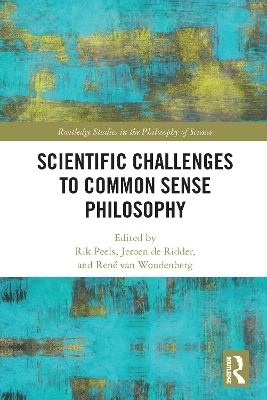
Scientific Challenges to Common Sense Philosophy
Routledge (Verlag)
978-0-367-53267-3 (ISBN)
Common sense philosophy holds that widely and deeply held beliefs are justified in the absence of defeaters. While this tradition has always had its philosophical detractors who have defended various forms of skepticism or have sought to develop rival epistemological views, recent advances in several scientific disciplines claim to have debunked the reliability of the faculties that produce our common sense beliefs. At the same time, however, it seems reasonable that we cannot do without common sense beliefs entirely. Arguably, science and the scientific method are built on, and continue to depend on, common sense.
This collection of essays debates the tenability of common sense in the face of recent challenges from the empirical sciences. It explores to what extent scientific considerations—rather than philosophical considerations—put pressure on common sense philosophy. The book is structured in a way that promotes dialogue between philosophers and scientists. Noah Lemos, one of the most influential contemporary advocates of the common sense tradition, begins with an overview of the nature and scope of common sense beliefs, and examines philosophical objections to common sense and its relationship to scientific beliefs. Then, the volume features essays by scientists and philosophers of science who discuss various proposed conflicts between commonsensical and scientific beliefs: the reality of space and time, about the nature of human beings, about free will and identity, about rationality, about morality, and about religious belief. Notable philosophers who embrace the common sense tradition respond to these essays to explore the connection between common sense philosophy and contemporary debates in evolutionary biology, neuroscience, physics, and psychology.
Rik Peels is Assistant Professor of Philosophy at Vrije Universiteit Amsterdam. He is the author of Responsible Belief: A Theory in Ethics and Epistemology (2016), editor of Perspectives on Ignorance from Moral and Social Philosophy (Routledge, 2017), and co-editor of The Epistemic Dimensions of Ignorance (2016) and Scientism: Problems and Prospects (forthcoming). Jeroen de Ridder is Associate Professor of Philosophy and NWO Vidi Research Fellow at Vrije Universiteit Amsterdam. He is co-editor of Scientism: Problems and Prospects (forthcoming) and The Future of Creation Order (forthcoming). René van Woudenberg is Professor of Philosophy at Vrije Universiteit Amsterdam. He is the co-editor of The Cambridge Companion to Thomas Reid (2005) and Scientism: Problems and Prospects (forthcoming).
1. Introduction: The Paradox of Science and Common Sense
Rik Peels, Jeroen de Ridder, and René van Woudenberg
2. Common Sense, Philosophy, and Science
Noah Lemos
3. How the Many Worlds Interpretation Brings Common Sense to Paradoxical Quantum Experiments
Kelvin J. McQueen and Lev Vaidman
4. Why the Many Worlds Interpretation of Quantum Mechanics Needs More Than Hilbert Space Structure
Meir Hemmo and Orly Shenker
5. Common Sense and Relativistic Supercoincidence
Yuri Balashov
6. Coincidence Problems without Properties
Peter van Inwagen
7. Conceptual Revisions: Intentions and Free Will in the Light of Cognitive Neuroscience
Pim Haselager
8. The Emergence of Free, Intentional Control: Reply to Haselager
Tim O’Connor
9. Psychological Challenges to Common Sense Philosophy: Illusions of Introspection and Free Will
Brett W. Pelham, Michael Harding, and Curtis Hardin
10. Radically Self-Deceived? Not So Fast
Fleur Jongepier and Quassim Cassam
11. Common Sense Morality and Its Evolutionary Underpinnings
Michael Ruse
12. Evolution and Moral Common Sense: Why You Can’t Have It Both Ways; A Response to Ruse
Regina Rini
13. Dual-Inheritance, Common Sense, and the Justification of Religious Belief
Taylor Davis
14. Cultural Evolution and Debunking Arguments: A Response to Davis
Aku Visala
| Erscheinungsdatum | 13.07.2022 |
|---|---|
| Reihe/Serie | Routledge Studies in the Philosophy of Science |
| Zusatzinfo | 23 Line drawings, black and white |
| Verlagsort | London |
| Sprache | englisch |
| Maße | 152 x 229 mm |
| Gewicht | 440 g |
| Themenwelt | Geisteswissenschaften ► Philosophie ► Erkenntnistheorie / Wissenschaftstheorie |
| Geisteswissenschaften ► Philosophie ► Metaphysik / Ontologie | |
| Naturwissenschaften | |
| ISBN-10 | 0-367-53267-0 / 0367532670 |
| ISBN-13 | 978-0-367-53267-3 / 9780367532673 |
| Zustand | Neuware |
| Haben Sie eine Frage zum Produkt? |
aus dem Bereich


![Was heißt Denken?. Vorlesung Wintersemester 1951/52. [Was bedeutet das alles?] - Martin Heidegger](/media/113619842)